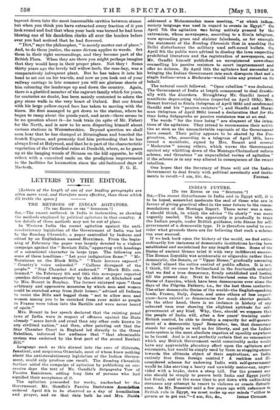INDIA'S FUTURE.
[To THE EDITOR or raa " SPECTATOR.") Sim —The recent disturbances in India and in Egypt will, it is to be hoped, somewhat moderate the zeal of those who are in favour of giving practical effect in the near future to the recom- mendations of the Montagu Report. There never was a ease, I should think, in which the advice "Go slowly" was more urgently needed. The idea apparently is gradually to train the Indian people, under British guidance, into fitness for self- government of a democratic type. It is therefore useful to con- sider what grounds there are for believing that such a scheme can ever succeed.
If we look back upon the history of the world, we find extra- ordinarily few instances of democratic institution having been established and maintained for any length of time. Some of the States of ancient Greece tried it with very indifferent success. The Roman Republic was aristocratic or oligarchic rather than democratic, the Senate, or "Upper House," gradually assuming to itself almost the entire control of public affairs. It is not, I think, till we come to Switzerland in the fourteenth century that we find a true democracy, firmly established and lasting till the present day. Next to Switzerland come the United States of America, which have been democracies ever since the days of the Pilgrim Fathers; i.e., for the last three centuries. The other democratic States of the world—the English-speaking lands, Frame, Italy, Japan, and some others of lees import- ance—have existed as democracies for much shorter periods. On the other hand, there is no instance in history of any coloured race ever showing the slightest aptitude for self- government of any kind. Why, then, should we suppose that the people of India will, after a few years' training under British control, be able to develop a capacity for self-govern- meat of a democratic type? Remember, too, that democracy stands for equality as well as for liberty, and yet the Indian caste-system is the most absolute negation of equality anywhere to be found. And is it not perfectly certain that no concessions which any British Government could conceivably make would have any appreciable placatory effect upon the agitators and extremists, but would be simply need by them as stepping-stones towards the ultimate object of their aspirations, an India entirely free from foreign control ? A reckless and ill- considered scheme for endowing India with eelfsmwernment would be like starting a heavy and unwieldy motor-car, unPrc- sided with a brake, down a steep hill. For the present our aim should be simply to govern both India and Egypt justly but firmly, and at the same time to put down with unflinching sternness any attempt to resort to violence or create disturb- ance. As Mr. Roosevelt said a few years ago with reference to British rule in Egypt, we must make up our minds "either to


































 Previous page
Previous page